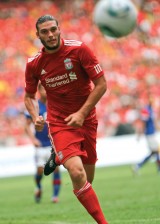Jim Sells, Manager of Premier League Reading Stars, suggests five ways of engaging with primary children through the use of sporting...
One of the most important skills that schools teach their young pupils is reading, which is essential for a successful, happy and fulfilling life. Worryingly, boys are nearly twice as likely to say that they never read as girls*. So what can we do to fix this? National Literacy Trust research has shown that over a quarter of boys (28.3%)** say that a sportsperson could inspire them to read. With the UEFA Euro 2012 competition fast approaching in June, now is the perfect time to plan some football-related tasks.
 1. Having someone from outside the school come in to talk about football and reading can have a powerful impact. Getting a player is the dream, of course, but that can be tricky. You need to be realistic – don’t go writing to Manchester United if you live in Dorset! Players from the Championship or Leagues One or Two will still generate a huge amount of excitement among pupils; the power of the badge does the trick every time.
1. Having someone from outside the school come in to talk about football and reading can have a powerful impact. Getting a player is the dream, of course, but that can be tricky. You need to be realistic – don’t go writing to Manchester United if you live in Dorset! Players from the Championship or Leagues One or Two will still generate a huge amount of excitement among pupils; the power of the badge does the trick every time.
So think local. You could also try asking anyone with an exciting job that links to sport in some way. Why not ask a local sports journalist or a local club coach? Alternatively, there are lots of authors writing football books for children, though they do usually charge a fee and expenses unless they are on tour promoting their books. You can find some more tips on contacting clubs at the National Literacy Trust website: http://bit.ly/xUaboq
2. Reading is not just about books! Tell your pupils to spend the next week looking at football coverage in newspapers to prepare for a class challenge. Compose a quiz based on newspaper and magazine headlines, perhaps by blacking out words and asking pupils to guess the missing word. Arrange for prizes to be won!
3. Read a section from a football story (Tom Palmer’s Foul Play: The Danger Academy is great for this) and then ask your pupils a question about the passage.
4. Use the power of football to boost your pupils’ confidence. Why not try a warm-up game before a reading task? Get the children to stand up and space out, then throw a football around the room. Each time someone catches it, they have to say their name, favourite football team, favourite book and something unusual like their favourite dessert.
5. Get inspiration from your pupils’ favourite players. Our Premier League Reading Stars programme works with 20 high-profile Premier League players. Each player selects his favourite children’s and adult’s books to create a 40-strong overall book recommendation list.
Any child with internet access can also watch a bank of online films in which the Premier League players set 100 literacy challenges. Completing the challenges unlocks reward films, in which the players explain the reasons for picking their books and what they enjoy about reading. A child completing all 100 will get the chance to win some signed memorabilia. More information can be found at premierleagurereadingstars.org.uk
The National Literacy Trust Premier League Reading Stars resource pack has been created to support boys’ literacy, target reluctant readers, combat negative peer pressure and increase school library use. Other sport-related tips and ideas are available on the ational Literacy Trust website (literacytrust.org.uk) by searching under ‘resources’.
* Clark, Christina, Setting the Baseline: Reading Report, London: National Literacy Trust, 2011.
** National Literacy Trust study on role models: Reaching out with role models: the impact of role models on young people’s reading behaviour, Clark, Dugdale and Osbourne, April 2009.
Use the bottle-flipping craze to create good school behaviour, not bad
Behaviour Management
Use scaffolding to wean children off high levels of TA support
Ace-Kitchen-Manager
